Six rising research stars at the University of Otago have been recognised through the University's annual Early Career Awards for Distinction in Research announced today.
The awards went to Dr Rosie Brown (Department of Anatomy), Dr Allan Gamble (School of Pharmacy), Dr Tracy Melzer (Department of Medicine, University of Otago, Christchurch), Dr Robert Odolinski (School of Surveying), Dr Michael Pankhurst (Department of Anatomy) and Dr Daniel Ribeiro (School of Physiotherapy).
"The University is committed to recruiting and recognising outstanding early-career researchers; the nominees and awardees this year will all serve us and their disciplines very well for many years to come."
As part of the award, the recipients get a five-year membership of the University's O-Zone group, which promotes research and facilitates networking and collaborations, helping early career researchers sustain focus and momentum.
O-Zone co-convenor Dr Louise Bicknell says the awards capture the breadth and variety of research being undertaken at the University.
“The awards are about celebrating not just the research the recipients are undertaking now but their research potential,” she said.
Dr Bicknell says the careers of the award winners are already on a great trajectory and these awards can help foster the next steps.
Professor Richard Blaikie, Deputy Vice-Chancellor (Research and Enterprise), who chairs the award selection panel, was also exceptionally pleased with the quality of the awardees.
“The University is committed to recruiting and recognising outstanding early-career researchers; the nominees and awardees this year will all serve us and their disciplines very well for many years to come.”
About the 2018 recipients of Early Career Awards for Distinction in Research:
Dr Rosie Brown (Anatomy)
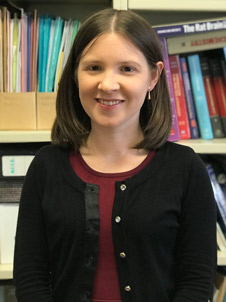
Dr Rosie Brown.
Dr Rosie Brown works in the field of neuroendocrinology, researching the actions of the hormone prolactin in the brain.
A Research Fellow in the Department of Anatomy, School of Biomedical Sciences since 2013, Dr Brown's early research looked at prolactin and its impact on infertility.
More recently, the focus has changed to look at the part the hormone plays in maternal nursing behaviour after birth.
One of her research goals is to identify things that are going wrong when a mother struggles to establish a bond with her baby. Another is to build her own team of researchers looking at different aspects of maternal behaviour.
Dr Brown is well published in top discipline-specific journals, has gained prestigious prizes and research funding and has been an invited speaker at international and national meetings.
She completed her PhD in the Departments of Anatomy and Physiology at the University of Otago in 2010 and in 2017 she secured a Marsden Fast Start grant for “The neurobiology of maternal behaviour – dissecting the role of prolactin in the medial preoptic area”.
With an emphasis on thinking proactively about her research, she enjoys the challenge of designing new experiments to test her hypotheses. She says she hopes the award will assist in furthering work at the University in understanding the neurobiology underlying parent-infant interactions.
Dr Allan Gamble (Pharmacy)
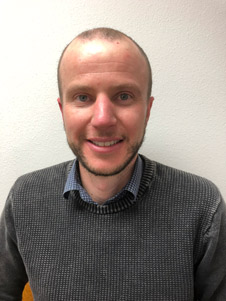
Dr Allan Gamble.
Looking at new ways to deliver drugs for cancer treatment is the current focus of Senior Lecturer Dr Allan Gamble.
He is a synthetic chemist who has branched out into chemical biology and drug delivery, and is using synthetic chemistry to activate a drug when and where it is required, significantly increasing the drug's effectiveness while reducing its toxic side effects.
“It's very exciting and great to see that my work has been recognised by the University for contributing to the greater scientific community,” Dr Gamble says.
He completed his PhD in Organic Chemistry at the University of Wollongong, before taking on a postdoctoral fellowship and Post-PhD teaching fellowship at Australian National University. He was then a Sir Keith Murdoch research fellow at Stanford University in Northern California, before coming to Otago.
He has won numerous prizes including the 2016 Otago University Students' Association new supervisor of the year award.
“I look forward to the next phase in my research career at the University – working with my talented research students and postdocs,” he says.
Dr Tracy Melzer (Medicine, University of Otago, Christchurch)
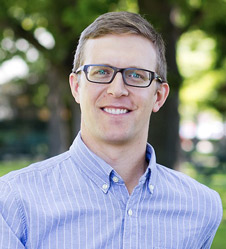
Dr Tracy Melzer.
A Senior Research Fellow in the Department of Medicine, University of Otago, Christchurch, Dr Tracy Melzer's principal area of research is using different brain imaging techniques, including magnetic resonance imaging (MRI) and positron emission tomography (PET), to investigate a number of different conditions and diseases, including cognititive impairments associated with Parkinson's Disease.
He holds a Sir Charles Hercus Career Development Fellowship, is the MRI Research Manager for the New Zealand Brain Research Institute (Christchurch) and has international collaborations with centres of excellence around the world, and also with local and regional projects and programmes.
He has published 28 refereed journal articles which have been cited 1,212 times; one of his papers, “Grey matter atrophy in cognitively impaired Parkinson's disease” published in the Journal of Neurology, Neurosurgery and Psychiatry has been cited 178 times and was highlighted as one of 11 potential “citation classics” by the journal.
As a principal investigator he has attracted more than $1.1 million in funding for projects since 2013 and has obtained more than $890,000 in fellowships and scholarships. He is a principal investigator in the Brain Research New Zealand-Rangahau Roro Aotearoa Centre of Research Excellence.
Dr Melzer says he is honoured to receive the award and hopes to continue to perform exciting resarch and ultimately improve outcomes for patients with Parkinson's disease.
Dr Robert Odolinski (Surveying)
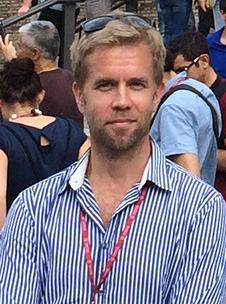
Dr Robert Odolinski.
Dr Robert Odolinski is a geodesist involved in the science of measuring and understanding earth's position, shape and orientation in space.
His research focus is precise positioning using Global Navigation Satellite Systems, specifically deriving more accurate ground-based positions from using multiple satellites.
With an estimated 100 navigation satellites by 2020, this increase in data has resulted in rapidly improved modelling which is revolutionising the science of geodetic surveying.
Using mathematical modelling, Robert was the first to combine four satellite systems for precise positioning, and the first to prove the feasibility of low-cost precise positioning which has become important with decreasing costs in technology.
His work can be used to improve smartphone GPS applications for navigation, and be applied to a diverse range of uses from aircraft systems, to engineering surveying and self-driving vehicles.
Dr Odolinski is a Senior Lecturer in the National School of Surveying, where he arrived in 2015 at the completion of his PhD from the Department of Spatial Science at Curtin University (Perth).
He has published 20 peer-reviewed articles since 2013 and been cited 481 times since 2015.
Dr Odolinski is also a member of the Inter-Commission Committee on Theory: 'Multi-GNSS theory and algorithms' in the 10-member group of the International Association of Geodesy.
Dr Michael Pankhurst (Anatomy)
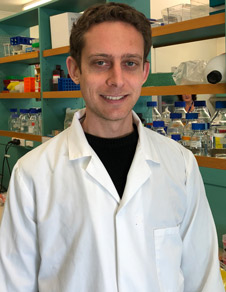
Dr Michael Pankhurst.
Dr Michael Pankhurst completed his BSc (Hons) in Biochemistry and his PhD in Neuroscience at the University of Tasmania, and joined the University of Otago in 2011 as a Postdoctoral Research Fellow in the Department of Anatomy. He was offered a lectureship at the Department earlier this year.
He says the melding of his studies in biochemistry and neuroscience began at Otago, when he started looking at the effects of the anti-Müllerian hormone (AMH) on male brain development.
His work currently focusses on the mechanisms responsible for the age-related onset of infertility in females, particularly the involvement of AMH in this process.
“I'm trying to map the decline in female fertility with aging,” he says.
Last year he was awarded a Health Research Council Sir Charles Hercus Fellowship to study “Bi-modal anti-Müllerian hormone signalling in the ovary”. In 2014 he was part of a team awarded a Health Research Council grant of $1.2 million for research into “AMH regulation of female reproduction”.
Dr Pankhurst has published widely in his field, including prestigious invited reviews, and has formed collaborations with researchers at universities in Australia, Canada, the Netherlands and the UK.
He also contributes to the department's overall research environment through conference organisation, hosting visits from prominent international scientists and supervising and mentoring postgraduates.
“Otago is a great place to set up a career, I've had amazing support.”
Dr Daniel Ribeiro (Physiotherapy)
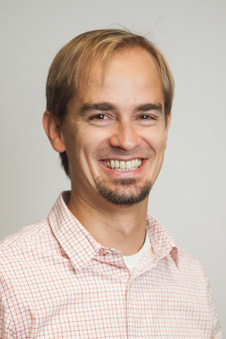
Dr Daniel Ribeiro.
Dr Daniel Ribeiro says the award has particular value to him, given the calibre of staff at the University of Otago.
“We have so many great researchers and academic staff so it is great to be acknowledged in this way.”
Dr Ribeiro is a clinical researcher in musculoskeletal disorders who completed his undergraduate degree and Masters study in Brazil.
He was attracted to Otago by the reputation of the University and its staff and has been a lecturer in the School of Physiotherapy since completing his PhD there in 2013.
He has been highly successful in securing funding and was notably awarded three prestigious Health Research Council Grants – the Sir Charles Hercus Health Research Fellowship, the HRC Feasibility Grant and the Emerging Research First Grant.
He has a strong publication record, is Associate Editor to two reputable journals in his field.
A strong advocate and supporter of early career researchers, he is an early career representative at the Health Sciences Divisional Research Committee. With others, he has proactively advocated for more support to early and mid-career researchers and helped to plan and run two workshops targeting academic and research staff interested in applying for research grants and fellowships.